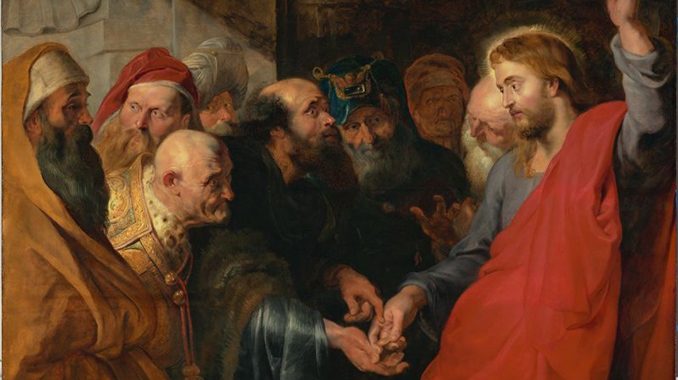On the Readings for Sunday, October 18, 2020
October 16, 2020 Carl E. Olson The Dispatch 2Print

Readings:
• Isa 45:1, 4-6
• Psa 96:1, 3, 4-5, 7-8, 9-10
• 1 Thess 1:1-5b
• Matt 22:15-21
Jesus was asked many questions during his public ministry. Some were asked in curiosity, some out of an honest desire for truth; some were expressed with hope, and some were touched with fear or anger. But few, if any, were asked with such careful cunning and devious planning as the one heard in today’s Gospel: “Is it lawful to pay the census tax to Caesar or not?”
It is evident that the question was the result of attentive scheming because of the unlikely alliance of those who asked it. The Pharisees were nationalistic and strongly opposed to Roman rule; the Herodians were supporters of the Roman-backed Herod and sought the reestablishment of his power in Judea. What they shared was a common dislike and fear of a mysterious, itinerant preacher whose popularity among the people had gone from annoying to troublesome.
The question was a rather brilliant attempt to trap Jesus, for it set up a seemingly airtight conundrum. If Jesus had said Caesar’s tax was unlawful—that is, opposed to the Torah and Jewish beliefs—he would have been immediately charged with political insurrection against Roman rule. If he said the tax was lawful, he would have alienated and angered many of his followers and effectively destroyed his growing influence. “On the political level occupied by the questioners,” wrote Fr. Hans Urs von Balthasar of this confrontation, “he can find no third possibility, no back door exit. But Jesus does not permit himself to enter this level.”
Put another way, Jesus did not believe that liberation from political oppression was Israel’s greatest problem, nor did he believe it was best dealt with through violence and political agitation. Revolts against Roman taxes and rule were not uncommon in first-century Palestine. When Jesus was a young boy, around A.D. 6, Judas the Galilean led one such revolt, and was summarily destroyed by the Romans, an event mentioned by the Evangelist Luke (Acts 5:37).
Recognizing the intention of his interlocutors, Jesus requested to see “the Roman coin”, a silver denarius, worth about one day’s wages. It was marked with the image of Tiberius Caesar (A.D. 14-37), identified on one side as “son of the divine Augustus” and on the other as the “high priest.” That the questioners had the coin in their possession meant they operated willingly within Rome’s economic system, thus exposing the hollowness of their feigned interest in Jesus’ opinion.
Jesus’ response was both direct and enigmatic: “Then repay to Caesar what belongs to Caesar and to God what belongs to God.” Caesar had legitimate power to tax and carry on the proper work of a government, but was subordinate to the all-encompassing power of the all-mighty Creator. Some things belong to Caesar, but all things belong to God, notes von Balthasar, “because man is created according to God’s image, not Caesar’s, and because God is Ruler over all earthly kings. Kings think they are sacral powers and claim divine attributes; Jesus demystifies this sacrality.”
The Greek word used by Jesus for “image” (eikon) was the same Greek word found in the Septuagint translation of Genesis 1:26-27: “And God said, Let us make man according to our image and likeness…” Caesar could make rightful claim to coins bearing his image, but only God can make claim to each man, woman, and child; only God can rightfully ask for worship and adoration. All governments, whether they acknowledge or not, are ultimately answerable to God, “for there is no authority except from God, and those that exist have been established by God (Rom 13:6-7; cf. 1 Pet 2:13-15; Catechism, par 2242).
Jesus’ answer to the trick question could itself be rendered as a question, but without any trickery involved: “Who made us and what are we made for?” Made in the image of God, man is meant for eternal communion with God. Our faith in him must guide us in every area of our earthly lives, including the realm of politics and temporal power.
(This “Opening the Word’ column originally appeared in the October 16, 2011, edition of Our Sunday Visitor newspaper.)

About Carl E. Olson 1141 ArticlesCarl E. Olson is editor of Catholic World Report and Ignatius Insight. He is the author of Did Jesus Really Rise from the Dead?, Will Catholics Be “Left Behind”?, co-editor/contributor to Called To Be the Children of God, co-author of The Da Vinci Hoax (Ignatius), and author of the “Catholicism” and “Priest Prophet King” Study Guides for Bishop Robert Barron/Word on Fire. He is also a contributor to “Our Sunday Visitor” newspaper, “The Catholic Answer” magazine, “The Imaginative Conservative”, “The Catholic Herald”, “National Catholic Register”, “Chronicles”, and other publication